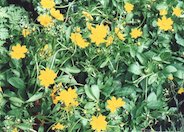
Common name:Dwarf Eared Coreopsis
Botanical name:Coreopsis auriculata 'Nana'
A low, mat-forming perennial to 2' wide, the 'Nana' bears deep orange yellow flowers on short stalks from spring through fall (if deadheaded faithfully), and occasionally into winter. It requires sun and average watering. -Monterey Bay Nursery
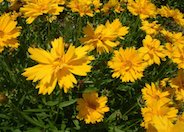
Common name:Double Sunburst Coreopsis
Botanical name:Coreopsis grandiflora 'Double Sunburst'
The 'Double Sunburst' is a wonderful cultivar and a showy, Southern U.S. native. Golden yellow, double flowers on 2' bushy plants bloom from June to September in full sun and average to dry soils. It makes for good cut flowers, and pruning keeps the plants abundant with blooms. -Holland WIldflower Farm
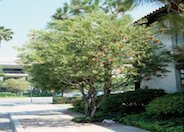
Common name:Lemon Bottlebrush
Botanical name:Callistemon citrinus
A large evergreen shrub, the Lemon Bottlebrush bears masses of bright red flowers in the spring and summer that are shaped, as the name implies, like a 'bottle brush.' New foliage grows in a bright, bronzy red.
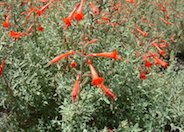
Common name:California Fuchsia, Zauschneria
Botanical name:Epilobium canum
The California fuchsia is a perennial with dense, narrow, green gray foliage and red orange summer flowers. The growth habit of this plant is sprawling and low. The California fuchsia is native to California, is drought tolerant, and attracts hummingbirds. -Cornflower Farms
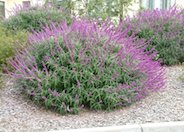
Common name:Mexican Bush Sage, Velvet Sage
Botanical name:Salvia leucantha
The Mexican Sage is a bushy shrub that grows 3'-4' tall and wide. It has hairy white stems, gray green leaves and velvet-like purple flower spikes that bloom summer through fall. This shrub tolerates sun, light shade, little water, and is hardy to 15 degrees F. The Mexican Sage is drought tolerant and attracts hummingbirds. -Cornflower Farms
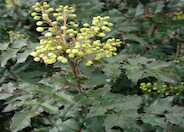
Common name:Oregon Grape
Botanical name:Mahonia aquifolium
Exhibiting erect growth, this evergreen shrub grows to a height of 6'. The leaves are 4"-10" long, with 5-9 very spiny-toothed, oval leaflets that are 1.5" in length.
| Designer: | Color Near Driveway |
Photographer: GardenSoft |
Soils and Compost:
Physical weed control, including mulching, or hand removal protects the watershed from harmful chemicals.
Integrated Pest Management:
Develop healthy soil for plants that are vigorous and naturally pest-resistant.

